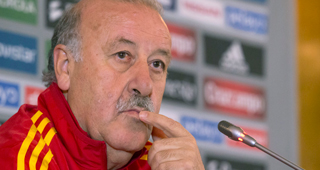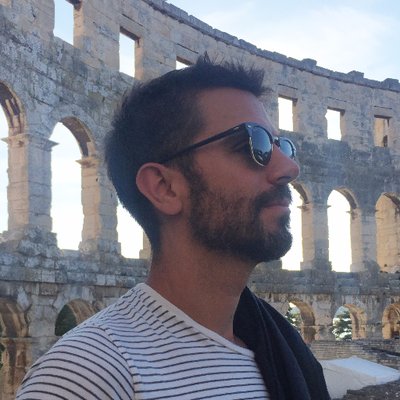Barcelona is probably the closest thing to a national team on the club level, at least at the elite levels of European football. They represent Catalonia in many meaningful ways both directly and indirectly, plus they have the strength of La Masia to build upon to create a roster of homegrown players.
But Barcelona also has belonged to Lionel Messi (Argentina), Ronaldinho, Rivaldo and Dani Alves (Brazil), Johan Cruyff (Netherlands), Thierry Henry (France) and Michael Laudrup (Denmark), amongst dozens other lesser names. Like every other top club, Barcelona enters the transfer windows identifying their weaknesses and flushed with cash to fix those areas that can't be solved through their academies.
In national team football, you largely are beholden to the types of players your country creates organically through its footballing culture. The influence a country's football federation can wield is limited, but Spain/Barcelona produced a golden generation of midfield wizards that could pass brilliantly and quickly through tight spaces like pinball until the movement creates chances ripping through the defense in a collective effort.
I’m on record as an ardent believer in tiki-taka, but Spain was unrecognizable in their 2-0 loss against Chile with Xavi on the bench. Vicente del Bosque attempted to shake up the starting XI by starting Javi Martinez and Pedro to have more pace, but as my colleague Yu Miyagawa wrote, You can’t “tweak” tiki-taka because it’s more than a system, it’s a lifestyle.
A big reason for Spain’s success has been their almost religious commitment to tiki-taka, but there is no need for a complete and singular devotion to one god in soccer. The style of football played by Spain and Barcelona may be called tiki-taka, but it really could have been called Xavi-taka over the past six years because he was always the most important part of the system. Xavi is arguably the greatest Spanish footballer in its history with how vital he has been in winning trophies for Spain and Barcelona, but he’s 34, 5’7 and on his way to Qatar.
Spain was convincingly thrown out the moon door, but they were done so by two teams that can beat anyone in the world in the Netherlands and Chile. Their flaws were exposed brutally and entirely over their first two matches in a way that wouldn’t have happened in a weaker group, but would have surely transpired in an accelerated way at some point in the knockout phase.
There was no chance of del Bosque making the type of wholesale changes that would have been necessary to be a viable championship contender; to paraphrase Donald Rumsfeld, “You go to the World Cup with the players you have, not the players you might want or wish to have at a later time.”
Every golden generation eventually gets old and this one accomplished as much as any in history and there’s another potentially brilliant crop behind Xavi, Andres Iniesta, Xabi Alonso, etc. in Koke, Thiago, Isco, Gerard Deulofeu, Alberto Morento, etc.
But there are three primary issues with Spanish football that makes tiki-taka unnecessarily one-dimensional and why they were clearly not one of the “complete” teams even before the World Cup began.
1. Dribbling
Spain’s attack is entirely reliant on the pass and the lack of dribbling threats is a systemic issue for players from this country, even for those who have never been part of Barcelona’s system. Spain has had just 11 successful dribbles over the first two World Cup matches, placing them in the bottom third in the competition.
Out of the top-25 dribblers per game in the Champions League last season, Andres Iniesta was the only Spaniard. The UCL is a competition that Spanish club teams did extraordinarily well in, but not in terms of this area.
Zeroing in on La Liga, nearly all of the top dribblers were imports with Yacine Brahimi, Lionel Messi and Neymar comprising the top-3 ahead of Iker Muniain of Athletic Bilbao, who has been dubbed the Spanish Messi. Spain needs to find a consistent place for Munian, who is just 21, because the difference between Barcelona and Spain is the former has those dynamic dribblers in Messi and Neymar. Spain overcame Barcelona's co-dependence on Messi in the past (we'll see if Messi can do the same with Argentina in this World Cup) and will need to do so again in committing themselves to diversifying the roster.
The epilogue to this article includes the goal scorers for Spain’s three consecutive major tournaments and it is remarkable in hindsight how critical David Villa and Fernando Torres were in this area. Both players fell off quickly and have been discarded by their club teams, but Spain didn’t have any viable replacements and were still included on this World Cup roster.
The final triumph we'll remember was a 4-0 win over Italy, but that was a complete aberration from what they typically were during their dynasty. Spain were beating you 1-0 as they did in all four knockout stage matches in the 2010 World Cup more often they were going to run you off the pitch.
2. Physicality
When you compare Spain to squads like Switzerland, France and Germany, their inferiority physically is evident. Spain does everything right in terms of touch, but their lack of strength and speed are major problems that become complete vulnerabilities when they are unable to control possession. Costa even admitted that Chile was “much better physically” than Spain.
While they cannot lose their central identity, a larger commitment to getting stronger is necessary. Spain must become harder, better, faster stronger as part of their new gospel.
Real Madrid has two of the most athletically gifted footballers in the world in Cristiano Ronaldo and Gareth Bale, along with Karim Benzema’s 6’2 physical presence in the middle, and Angel di Maria’s wiry strong and remarkable work rate up and down the left flank. Spain looked tired and a step slow throughout and don't have anybody on the roster anywhere near those four physically, just as Barcelona looked similarly slow and tired in the Champions League and at times in La Liga.
3. Mediocre Defensively
Tiki-taka is as much about defense as it is scoring since you’re not allowing goals when you control the ball and win it back quickly in the opponent’s third. Gerard Pique was way too slow against the Netherlands and was benched against Chile, while Sergio Ramos also struggled with the pace of Arjen Robben. Ramos played better against Chile and was basically the only player who showed up in the match, but Spain was never able to replace what Carles Puyol brought defensively, nor as someone who can win headers off set pieces.
Jordi Alba and Cesar Azpilicueta figured to still play important roles in 2016 and 2018 as the fullbacks on the left and right, but need to give more help on actually playing defense.
------
Some have criticized Del Bosque for being excessively loyal to this generation, leaving the 2014 roster virtually unchanged from the 2010 team, but this group deserved the chance to go out on the pitch instead of on a wipe board. Other than Koke for Xabi Alonso, I’m not sure who else was ready at this point. Thiago could have made a huge difference in midfield if he hadn’t been injured, while David De Gea wasn’t available to replace Iker Casillas in the group stage due to an injury of his own.
Look, the problems facing Spain are a better set of problems to have than most countries. They are world class in one very important area of football and that remains the same, but they undoubtedly need to modernize and become less one-dimensional.
-------
Epilogue: How Spain Scored During Their Three-Tournament Run
- 2008 Euro Goals
Group Stage
Russia: David Villa (3), Cesc Fabregas
Sweden: Fernando Torres, David Villa
Greece: Ruben de la Red, Daniel Guiza
Knockout Stage
Italy: win on penalties
Russia: Xavi, Daniel Guiza, David Silva
Germany: Fernando Torres
- 2010 World Cup Goals
Group Stage
Switzerland: none
Honduras: David Villa (2)
Chile: David Villa, Andres Iniesta
Knockout Stage
Portugal: David Villa
Paraguay: David Villa
Germany: Carles Puyol
Netherlands: Andres Iniesta
- 2012 Euro Goals
Group Stage
Italy: Cesc Fabregas
Ireland: Fernando Torres (2), David Silva, Cesc Fabregas
Croatia: Jesus Navas
Knockout Stage
France: Xavi Alonso (2)
Portugal: win on penalties
Italy: David Silva, Jordi Alba, Fernando Torres, Juan Mata



